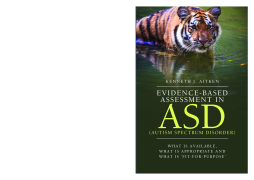
Additional Information
Book Details
Abstract
Advocating for an increased emphasis on evidence-based practice, this book describes and analyses a wide range of available Autism Spectrum Disorder (ASD) assessment measures. The author offers guidance on how to evaluate services and programmes and how to recognise which will be most effective in different scenarios for people with differing needs. A wide range of measures are reviewed in detail, including assessments used in situations often ignored in overviews relevant to ASD, such as assessments of internet addiction, response to traumatic stress, and criminal offending risk and witness credibility.
This book is an invaluable resource to professionals who support people with ASDs, including social workers and teachers, and who are under increasing pressure to reliably assess which services, programmes and therapies are effective and fit-for-purpose.
Kenneth J. Aitken is a practising clinical psychologist based in Fife, Scotland. He is active among many charitable organisations and research initiatives dedicated to building a better understanding of Autism Spectrum Disorders and related conditions.
Table of Contents
| Section Title | Page | Action | Price |
|---|---|---|---|
| Evidence- Based Assessment in ASD (Autism Spectrum Disorder): What Is Available, What Is Appropriate and What Is 'Fit-for-Purpose' by Kenneth J. Aitken | 3 | ||
| Introduction | 13 | ||
| Part 1 - General Issues | 25 | ||
| Part 2 - Core Areas in ASD Assessment Profiling | 49 | ||
| 2.1 Cognitive Ability/Intelligence | 52 | ||
| 2.2 Communication Skills | 68 | ||
| 2.3 Motor Skills and Motor Development | 85 | ||
| 2.4 Executive Functioning | 94 | ||
| 2.5 Central Coherence | 106 | ||
| 2.6 Working Memory | 115 | ||
| 2.7 Theory of Mind/Mentalising | 123 | ||
| 2.8 Eating and Drinking Issues | 139 | ||
| 2.9 Sleep Patterns and Sleeping Difficulties | 148 | ||
| 2.10 Daily Living Skills | 154 | ||
| 2.11 Social Skills | 161 | ||
| 2.12 Quality of Life | 172 | ||
| Part 3 - Non-Core Assessments | 179 | ||
| 3.1 Neuropsychological Issues | 182 | ||
| 3.2 Attention | 193 | ||
| 3.3 Behavioural Issues | 200 | ||
| 3.4 Restricted and Repetitive Stereotyped Behaviour | 211 | ||
| 3.5 Attention Deficit Hyperactivity Disorder | 217 | ||
| 3.6 Self-Injurious Behaviour | 227 | ||
| 3.7 Sensory Differences | 233 | ||
| 3.8 Anxiety | 242 | ||
| 3.9 Depression | 254 | ||
| 3.10 Obsessionality | 263 | ||
| 3.11 Fears and Phobias | 271 | ||
| 3.12 Trauma and Post-Traumatic Distress | 276 | ||
| 3.13 Legal Processes | 287 | ||
| 3.14 Internet Safety, Internet Addiction and Cyberbullying | 305 | ||
| 3.15 Bullying, Victimisation and Social Difficulties | 316 | ||
| 3.16 Physical Pain and Distress | 326 | ||
| 3.17 Assessing Affection, Friendship and Loneliness | 334 | ||
| 3.18 Happiness | 342 | ||
| 3.19 Parenting Stress | 347 | ||
| Part 4 - Overview and Synthesis | 355 | ||
| Parrt 5 - Conclusions | 357 | ||
| Appendix A | 362 | ||
| Appendix B | 365 | ||
| Appendix C | 379 | ||
| Notes | 381 | ||
| Subject Index | 462 | ||
| Author Index | 470 | ||
| Blank Page |
